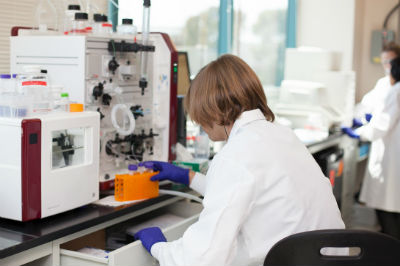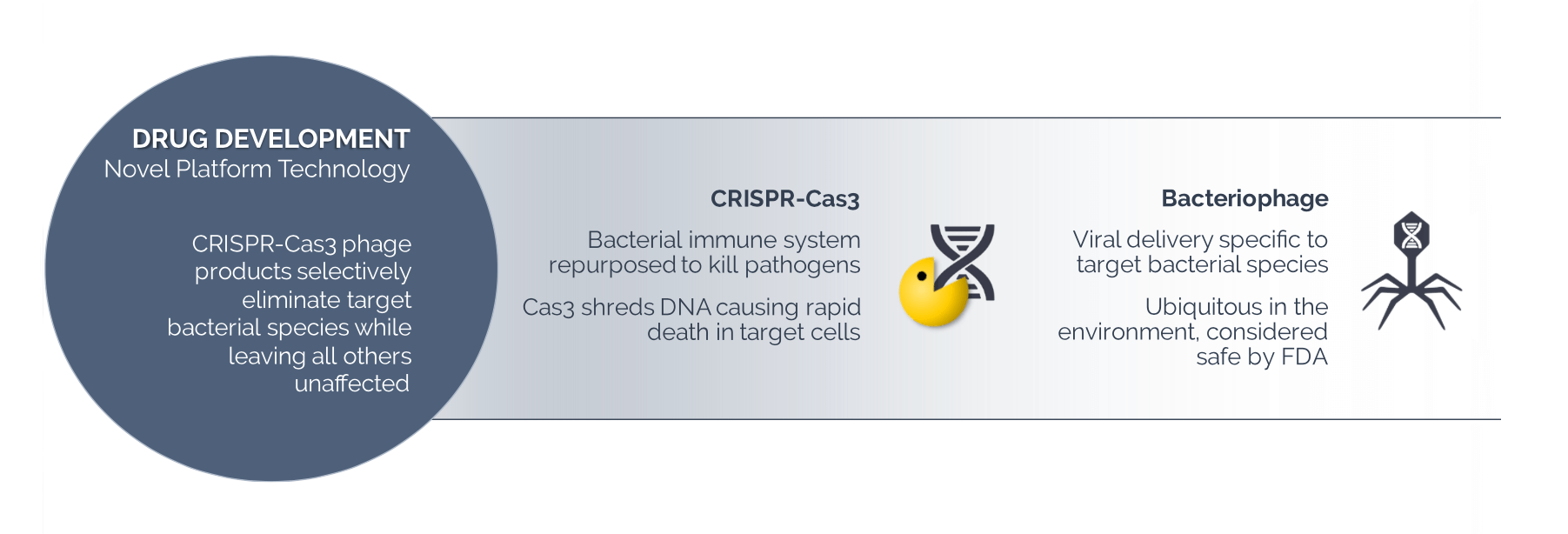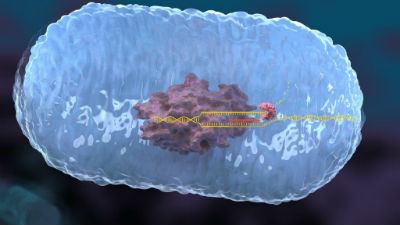
Locus Biosciences Acquires EpiBiome, Speeding Race for New Antibiotic Technology

Locus Biosciences is a fast-emerging North Carolina biotechnology company that’s about to get a lot faster at unfolding its Pac-Man-like genetic tricks to whack drug-resistant bacteria.
The Research Triangle Park company announced today that it has acquired EpiBiome, a young California firm with a high-speed technology platform that will put even more focus on Locus.
The companies declined to disclose financial terms of the asset purchase transaction. Locus officials have confirmed that the company is consolidating most operations into its RTP headquarters, but it will maintain EpiBiome’s former Union City, California site for at least the next six to nine months.
Five former EpiBiome team members are joining the Locus team, either as full-time employees or contractors, including EpiBiome co-founder and former CEO Aeron Hammack, Ph.D., and co-founder and former CSO Nick Conley, Ph.D., who have joined Locus’ leadership team.
Locus now employs 23 people full-time, including the EpiBiome employees coming aboard with this transaction. All but one of them are in North Carolina. Locus expects to grow its RTP employment to 30+ this year.

Locus, a 2015 spinout of North Carolina State University, was born with the help of two loans from the North Carolina Biotechnology Center.
Three of the four scientific founders of Locus have also received Biotech Center grants totaling more than $300,000. For example, a 2014 grant of $50,000 went to Barrangou for a research study titled “Novel CRISPR Systems for Efficient Genome Editing,” Another of the grants represents funding for a Pfizer-NCBiotech Distinguished Postdoctoral Fellows in Gene Therapy fellowship.
NCBiotech grant support for academic researchers’ innovation at early stages often allows for their ideas to grow into entrepreneurial companies, which the Center can then help bootstrap with startup and early-stage loans that wouldn't otherwise be available.
In the case of Locus, the company is developing a next-generation version of CRISPR-Cas, a high-profile new gene-editing technology. It’s developing precision antimicrobials that can combat antibiotic-resistant “superbug” bacteria such as such as Clostridium difficile, Pseudomonas aeruginosa and Enterobacteriaceae.
CRISPR is an acronym for a phenomenon in DNA structure called Clustered Regularly Interspaced Short Palindromic Repeats. Bacteria have evolved with it over millions of years to use it as a defense mechanism against invaders. In the past decade or so, scientists have found a number of accompanying enzymes that perform a variety of functions within bacterial cells, from cutting and killing to repression and activation of genes. The most well-known enzyme these days is Cas9, which can be used as a “molecular scissors” to clip DNA at specific places inside both bacterial and human cells.
A different CRISPR critter
Locus is developing CRISPR-based “smart bomb” drugs that kill antibiotic-resistant bacteria by selectively destroying their DNA while sparing non-threatening bacteria. But it avoids some of the complications of CRISPR-Cas9 by using another approach, CRISPR-Cas3 to kill targeted pathogens.

“Other companies are developing CRISPR applications to modify the human genome, but we are concentrating our efforts on removing deadly pathogens from the body,” explained Paul Garofolo, founder and chief executive officer of Locus. “As our technology targets antibiotic-resistant infections without risk to human cells, we can rapidly develop new infectious disease and microbiome therapies that avoid the risks posed by broad-spectrum antibiotics and their selection for antibiotic resistance.”
Locus designs and creates novel CRISPR RNAs (guide RNAs) that direct the powerful Cas3 enzyme to target and kill bacteria cells by irreversibly destroying bacterial DNA.
Its addition of EpiBiome’s high-throughput bacteriophage (“phage”) discovery platform pairs EpiBiome’s powerful phage isolation and characterization capability with Locus’s CRISPR-based synthetic biology platform and clinical development team. The combined entity is positioned to rapidly develop products to treat antibiotic-resistant bacterial infections and precisely edit the microbiome.
Locus is the world leader in CRISPR-engineered phage therapeutics, uniquely leveraging the powerful Type I CRISPR-Cas3 system to specifically destroy the DNA of target bacteria cells, quickly killing them. The company is the exclusive global licensee of the foundational CRISPR-Cas3 patent estate from NCSU and Duke University.
An Emerging Global Crisis
Phage have been used to kill bacteria for more than 100 years but fell out of favor when highly effective antibiotics were developed in the mid-20th century. However, abuse of antibiotics in agriculture and their over-prescription in medicine is creating a global crisis through the rapid emergence of antibiotic resistance. Scientists around the world are sounding the alarm that we are entering a post-antibiotic era in which all currently available antibiotics will soon be ineffective. This crisis has renewed interest in phage therapeutics.
Locus’s CRISPR-Cas3-engineered phage (“crPhage”) platform has the potential to revolutionize the way antibiotic products are developed by combining an extraordinary human safety profile of phages with the nimble advantage of CRISPR. crPhage products kill target bacteria, including antibiotic-resistant superbugs, while leaving the many species of good bacteria in the body unharmed.
The acquisition of EpiBiome’s automation platform helps Locus develop these crPhage products much more rapidly.

This advancement in technology is important because many large pharmaceutical companies have exited the antibiotics market due to the time, prohibitive costs, and risk related to developing new antibiotics. And in those rare instances when a powerful new class of antibiotics does make it to market, doctors and health systems often hold it in reserve to treat only those patients who don’t respond to anything else.
With Locus’s approach, the time, cost, and risk are reduced and there is no need to hold back effective products, making crPhage product development much more appealing than traditional antibiotic development to large pharmaceutical companies.
“EpiBiome built the world’s most effective automated platform for finding novel therapeutic phages,” said Garofolo. “Adding this high-throughput screening, genomics, and bioinformatics platform to the front end of our synthetic biology pipeline significantly accelerates our engineering of new phage products targeting specific bacterial populations, reducing the time to IND for new programs to as little as 12 months. We also expect to complete clinical development in less than half the time of traditional antibiotics.”
Proud of what EpiBiome built
EpiBiome’s Conley agreed, saying, “We’re proud of the one-of-a-kind high-throughput phage discovery platform that EpiBiome built – it has allowed us to create phage cocktails targeting a broad array of human pathogens effectively tackling the challenge of antibiotic resistance.”
EpiBiome’s Hammack added, “We are thrilled to partner with Locus, a world-class phage engineering company, to improve efficacy levels beyond what natural phages can achieve and to secure the intellectual property protection demanded by strategic partners.
In addition to strengthening its phage discovery platform, this transaction adds additional assets to the Locus development pipeline including a Staphylococcus aureus program and assets targeting other so-called ESKAPE pathogens, which are the leading causes of nosocomial (hospital-based) infections globally.
The acquisition also enhances Locus’s ability to develop phage cocktails to address dysbiosis, or microbial imbalance, in the human microbiome, which will enable Locus to rapidly tackle large-market indications such as inflammatory bowel disease and colorectal cancer.
With venture capital funding from ARTIS Ventures, Tencent Holdings, Abstract Ventures and others, Locus is rapidly moving its lead programs into clinical development for infectious disease and microbiome indications, with the first clinical trials on track to begin in 2019.
You can see a video of an EpiBiome robot in action here.
